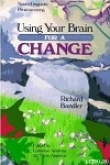
Текст книги "Frogs into Princes: Neuro Linguistic Programming"
Автор книги: Richard Bandler
Соавторы: John Grinder
Жанр:
Психология
сообщить о нарушении
Текущая страница: 17 (всего у книги 17 страниц)
When I was first doing therapy a man came in and said "I want to have better relationships with people." I said "Oh, so you have trouble relating to people?" He said "No, I get along fine with people. I enjoy my relationships a lot. I'd like to be able to do it even better." I looked into my therapy bag to see what to do for him, and there wasn't anything there!
Very rarely do people come in and say "Well, I'm confident but, boy, you know, if I were twice as confident things would be really wonderful." They come in and say "I'm never confident." I say "Are you sure of that?" and they say Absolutely
The idea of generative change is really hard to sell to psychologists. Business people are much more interested, and they're more willing and able to pay to learn how to do it. Often we do groups in which about half of them are business people, and half of them are therapists. I say "Now, what I want you to do is to go inside and think of three really different situations." The business people go inside and sell a car, win a lawsuit, and meet somebody they really enjoy. The therapists go inside and get beaten up as a child, have a divorce, and have the worst professional failure and humiliation of their life!
We are currently investigating what we call generative personality. We are finding people who are geniuses at things, finding out the sequence of unconscious programming that they use, and installing those sequences in other people to find out if having that unconscious program allows them to be able to do the task. The "cloning" thing we did for the ad agency is an example of doing that at the corporate level.
When we do that, things which were problems, and would have been meat for therapy, disappear. We completely bypass the whole phenomenon of working with problems, because when the structure is changed, everything changes. And problems are only a function of structure.
Man: Can that present new problems?
Yes, but they are interesting, evolutionary ones. Everything presents problems, but the new ones are much more interesting. "What are you going to evolve yourself to become today?" is a very different way of approaching change than "Where is it wrong?" or "How are you inadequate?" I remember once I was in a group with a gestalt therapist and he said "Who wants to work today?" Nobody raised their hand. And he said "There's really no one in here that has a pressing problem?" People looked at each other, shook their heads, and said "No." He looked at the people and said "What's wrong with you? You are not in touch with what's really going on if there's no pain here." He really made that statement; I was flabbergasted. Suddenly all these people went into pain. They all said "You're right! If I have no pain, I'm not real." Boom, they all went into pain, so then he had something to do therapy with.
That model of change does not produce really generative, creative human beings. I want to make structures that are conducive to creating experiences which will result in people who are interesting. People come out of therapy being lots of things, but rarely interesting. I don't think that it's anybody's fault. I think it's a result of the whole system and the presuppositions that underlie the system of psychotherapy and counseling. Most people are totally unconscious of what those presuppositions are.
As I walked around watching and listening to you practicing reframing, I saw a lot of you reverting to other patterns that I'm sure are characteristic of your habitual behavior in therapy, rather than trying something new. And that reminded me of a story:
Some fifteen or so years ago when the Denver zoo was going through a major renovation, there was a polar bear there, which had arrived at the zoo before a naturalistic environment was ready for it. Polar bears, by the way, are one of my favorite animals. They are very playful; they are big and graceful and do lots of nice things. The cage that it was put in temporarily was just big enough that the polar bear could take three nice, swinging steps in one direction, whirl up and around and come down and take three steps in the other direction, back and forth. The polar bear spent many, many months in that particular cage with those bars that restricted its behavior in that way. Eventually a naturalistic environment in which they could release the polar bear was built around this cage, on-site. When it was finally completed, the cage was removed from around the polar bear. Guess what happened? ...
And guess how many of those students at that university are still going down the maze, still trying to find the five-dollar bill? They sneak in at night and run down the maze to look and see if it just might be there this time.
We have been deluging you with information for three days now, totally overloading your conscious resources. And we'd like to offer you a couple of allies in this process which we have discovered are helpful to some people. Do people read Carlos Castaneda here? He's a whacko multiple personality with an Indian friend. There's a section in book two or three in which Don Juan gives a piece of advice to Carlos. We would not give this piece of advice to any of you, but we will repeat it for whatever it's worth.
You see, what Juan wanted to do to Carlos—which we wouldn't, of course, want to do to you—was to find some way of motivating him to be congruent and expressive in his behavior at all times, as creative as he could be as a human being. He wanted to mobilize his resources so that each act that Carlos performed would be a full representation of all the potential that was available to him—all the personal power that he had that was available to him at any moment in time.
Specifically what Juan told Carlos was "At any moment that you find yourself hesitating, or if at any moment you find yourself putting off until tomorrow trying some new piece of behavior that you could do today, or doing something you've done before, then all you need to do is glance over your left shoulder and there will be a fleeting shadow. That shadow represents your death, and at any moment it might step forward, place its hand on your shoulder and take you. So that the act that you are presently engaged in might be your very last act and therefore fully representative of you as your last act on this planet."
One of the ways you can use this constructively is to understand that it is indulgent to hesitate.
When you hesitate, you are acting as though you are immortal. And you, ladies and gentlemen, are not.
You don't even know the place and the hour of your death.
And so one thing you can do... to remind yourself that not to bother to hesitate is not to act unprofessional... is to just suddenly glance over your left shoulder and remember that death is standing there, and make death your advisor. He or she will always tell you to do something representative of your full potential as a person. You can afford no less.
Now, that's a little bit heavy. That's why we wouldn't tell that to you. We noticed that Juan told Carlos. We offer you an alternative.
If at any point you discover yourself hesitating, or being incongruent, or putting off until tomorrow something you could try now, or just needing some new choices, or being bored, glance over your right shoulder and there will be two madmen there, sitting on stools, insulting you.
And as soon as we finish the insults, you may ask us any question.
And that's just one way that your unconscious can present to you all the material that it has learned and represented during these three days.
Now, there's only one other thing that we like to do at the end of a workshop. And that is to say….
Goodbye!








